Recovery Nursing Care Plan - Case Study of Ben
VerifiedAdded on 2023/01/13
|10
|2535
|53
AI Summary
This case study focuses on the recovery nursing care plan for Ben, a 25-year-old male diagnosed with schizophrenia. It discusses his symptoms, identified goals/issues, nursing interventions, and the timeframe for monitoring his progress.
Contribute Materials
Your contribution can guide someone’s learning journey. Share your
documents today.
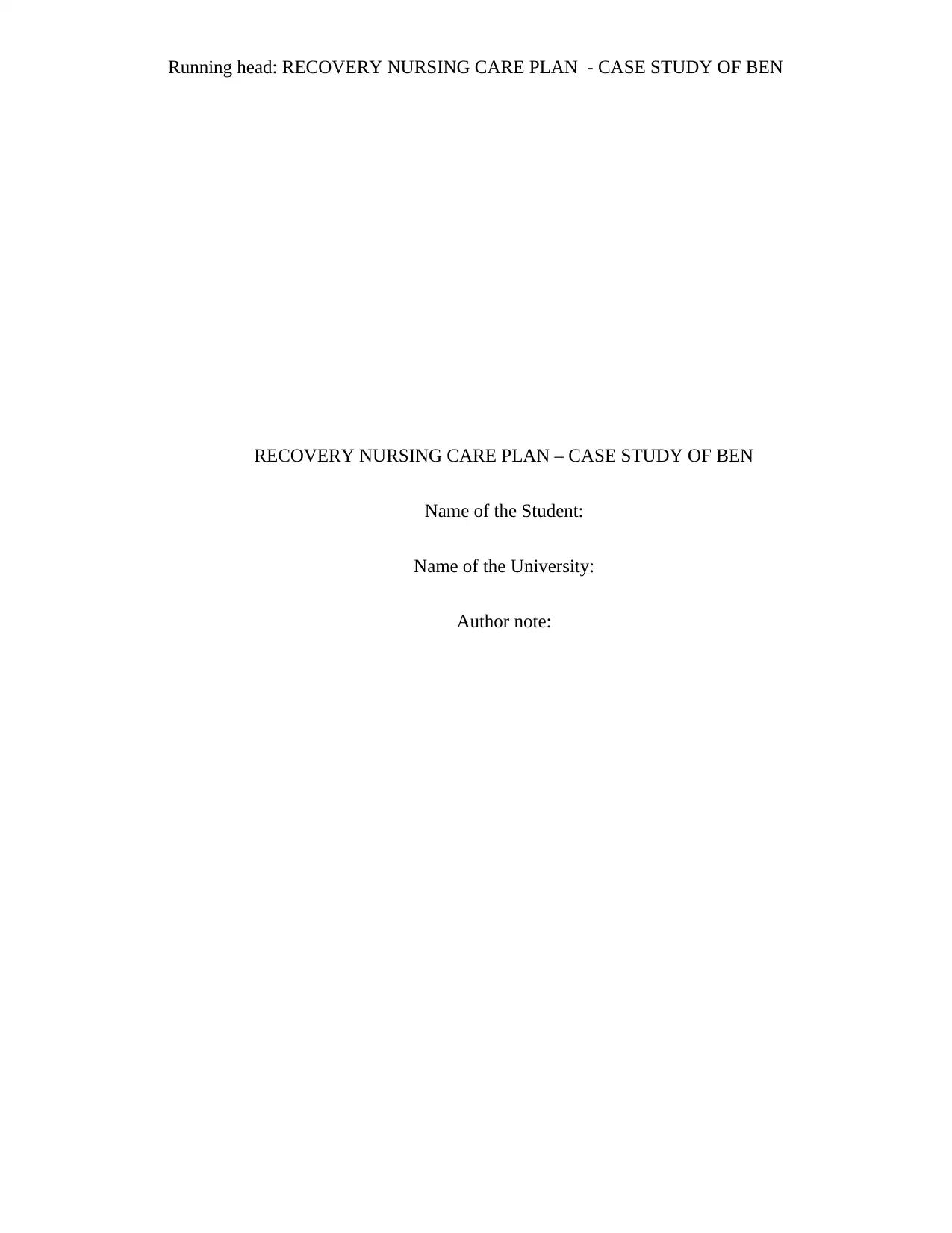
Running head: RECOVERY NURSING CARE PLAN - CASE STUDY OF BEN
RECOVERY NURSING CARE PLAN – CASE STUDY OF BEN
Name of the Student:
Name of the University:
Author note:
RECOVERY NURSING CARE PLAN – CASE STUDY OF BEN
Name of the Student:
Name of the University:
Author note:
Secure Best Marks with AI Grader
Need help grading? Try our AI Grader for instant feedback on your assignments.
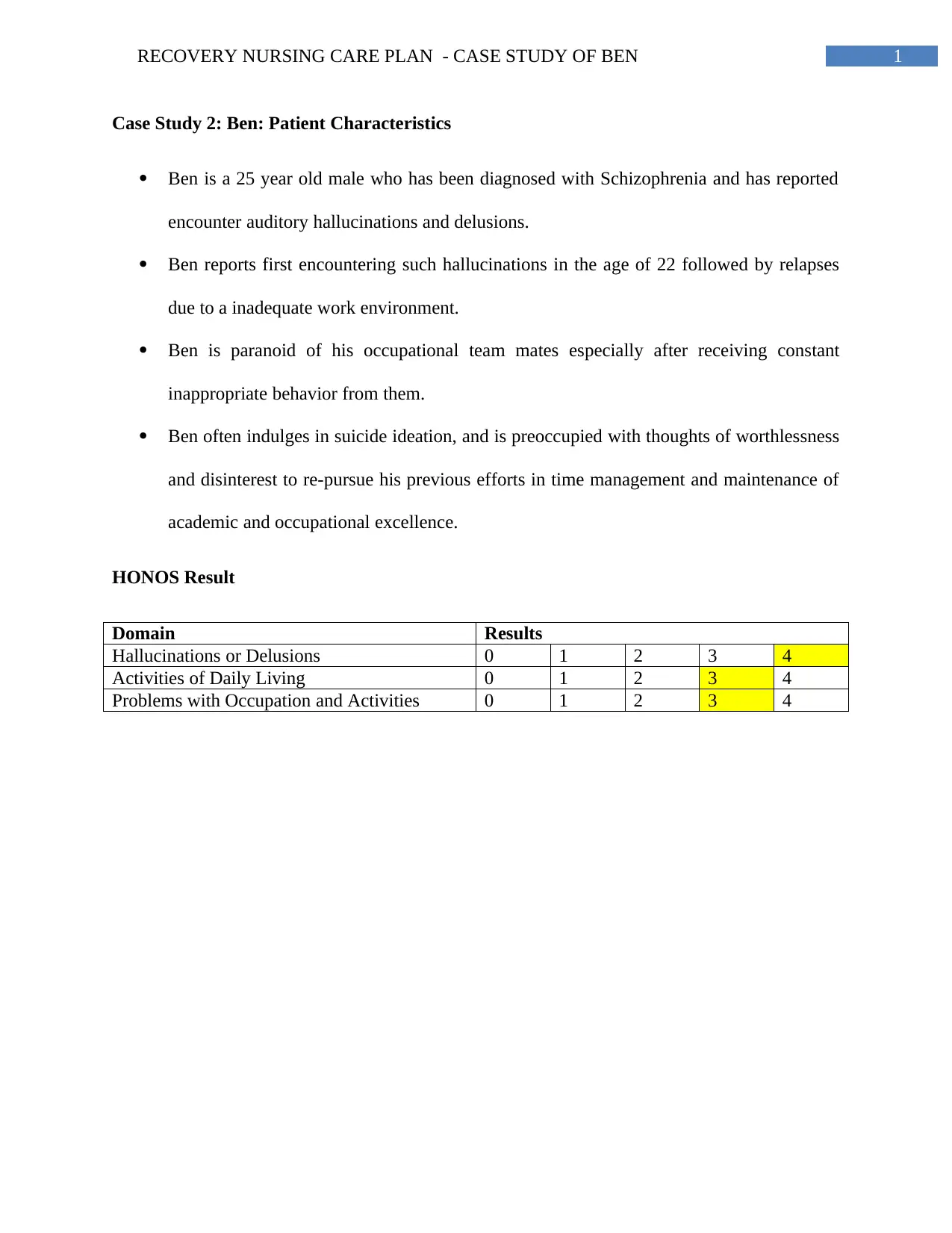
1RECOVERY NURSING CARE PLAN - CASE STUDY OF BEN
Case Study 2: Ben: Patient Characteristics
Ben is a 25 year old male who has been diagnosed with Schizophrenia and has reported
encounter auditory hallucinations and delusions.
Ben reports first encountering such hallucinations in the age of 22 followed by relapses
due to a inadequate work environment.
Ben is paranoid of his occupational team mates especially after receiving constant
inappropriate behavior from them.
Ben often indulges in suicide ideation, and is preoccupied with thoughts of worthlessness
and disinterest to re-pursue his previous efforts in time management and maintenance of
academic and occupational excellence.
HONOS Result
Domain Results
Hallucinations or Delusions 0 1 2 3 4
Activities of Daily Living 0 1 2 3 4
Problems with Occupation and Activities 0 1 2 3 4
Case Study 2: Ben: Patient Characteristics
Ben is a 25 year old male who has been diagnosed with Schizophrenia and has reported
encounter auditory hallucinations and delusions.
Ben reports first encountering such hallucinations in the age of 22 followed by relapses
due to a inadequate work environment.
Ben is paranoid of his occupational team mates especially after receiving constant
inappropriate behavior from them.
Ben often indulges in suicide ideation, and is preoccupied with thoughts of worthlessness
and disinterest to re-pursue his previous efforts in time management and maintenance of
academic and occupational excellence.
HONOS Result
Domain Results
Hallucinations or Delusions 0 1 2 3 4
Activities of Daily Living 0 1 2 3 4
Problems with Occupation and Activities 0 1 2 3 4
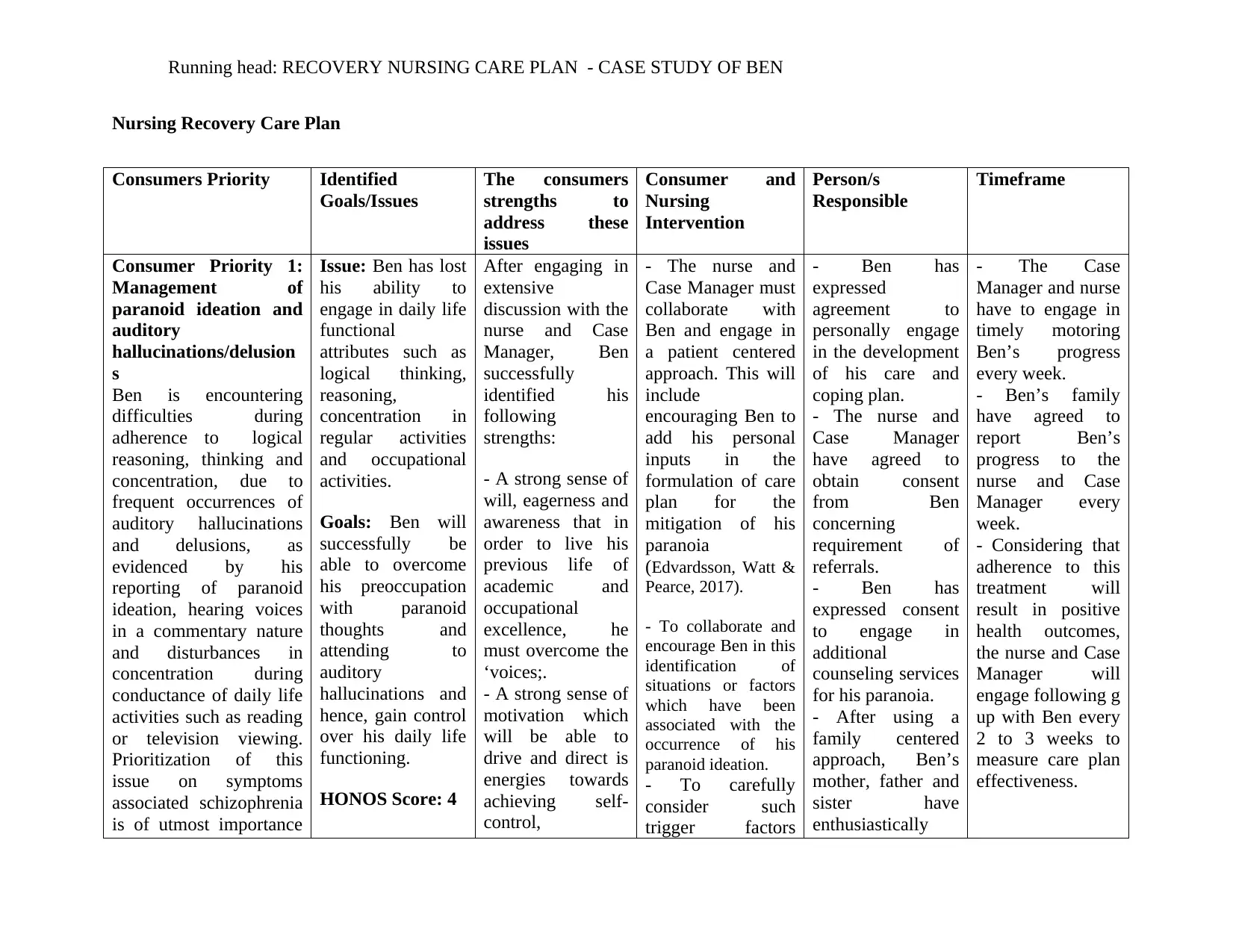
Running head: RECOVERY NURSING CARE PLAN - CASE STUDY OF BEN
Nursing Recovery Care Plan
Consumers Priority Identified
Goals/Issues
The consumers
strengths to
address these
issues
Consumer and
Nursing
Intervention
Person/s
Responsible
Timeframe
Consumer Priority 1:
Management of
paranoid ideation and
auditory
hallucinations/delusion
s
Ben is encountering
difficulties during
adherence to logical
reasoning, thinking and
concentration, due to
frequent occurrences of
auditory hallucinations
and delusions, as
evidenced by his
reporting of paranoid
ideation, hearing voices
in a commentary nature
and disturbances in
concentration during
conductance of daily life
activities such as reading
or television viewing.
Prioritization of this
issue on symptoms
associated schizophrenia
is of utmost importance
Issue: Ben has lost
his ability to
engage in daily life
functional
attributes such as
logical thinking,
reasoning,
concentration in
regular activities
and occupational
activities.
Goals: Ben will
successfully be
able to overcome
his preoccupation
with paranoid
thoughts and
attending to
auditory
hallucinations and
hence, gain control
over his daily life
functioning.
HONOS Score: 4
After engaging in
extensive
discussion with the
nurse and Case
Manager, Ben
successfully
identified his
following
strengths:
- A strong sense of
will, eagerness and
awareness that in
order to live his
previous life of
academic and
occupational
excellence, he
must overcome the
‘voices;.
- A strong sense of
motivation which
will be able to
drive and direct is
energies towards
achieving self-
control,
- The nurse and
Case Manager must
collaborate with
Ben and engage in
a patient centered
approach. This will
include
encouraging Ben to
add his personal
inputs in the
formulation of care
plan for the
mitigation of his
paranoia
(Edvardsson, Watt &
Pearce, 2017).
- To collaborate and
encourage Ben in this
identification of
situations or factors
which have been
associated with the
occurrence of his
paranoid ideation.
- To carefully
consider such
trigger factors
- Ben has
expressed
agreement to
personally engage
in the development
of his care and
coping plan.
- The nurse and
Case Manager
have agreed to
obtain consent
from Ben
concerning
requirement of
referrals.
- Ben has
expressed consent
to engage in
additional
counseling services
for his paranoia.
- After using a
family centered
approach, Ben’s
mother, father and
sister have
enthusiastically
- The Case
Manager and nurse
have to engage in
timely motoring
Ben’s progress
every week.
- Ben’s family
have agreed to
report Ben’s
progress to the
nurse and Case
Manager every
week.
- Considering that
adherence to this
treatment will
result in positive
health outcomes,
the nurse and Case
Manager will
engage following g
up with Ben every
2 to 3 weeks to
measure care plan
effectiveness.
Nursing Recovery Care Plan
Consumers Priority Identified
Goals/Issues
The consumers
strengths to
address these
issues
Consumer and
Nursing
Intervention
Person/s
Responsible
Timeframe
Consumer Priority 1:
Management of
paranoid ideation and
auditory
hallucinations/delusion
s
Ben is encountering
difficulties during
adherence to logical
reasoning, thinking and
concentration, due to
frequent occurrences of
auditory hallucinations
and delusions, as
evidenced by his
reporting of paranoid
ideation, hearing voices
in a commentary nature
and disturbances in
concentration during
conductance of daily life
activities such as reading
or television viewing.
Prioritization of this
issue on symptoms
associated schizophrenia
is of utmost importance
Issue: Ben has lost
his ability to
engage in daily life
functional
attributes such as
logical thinking,
reasoning,
concentration in
regular activities
and occupational
activities.
Goals: Ben will
successfully be
able to overcome
his preoccupation
with paranoid
thoughts and
attending to
auditory
hallucinations and
hence, gain control
over his daily life
functioning.
HONOS Score: 4
After engaging in
extensive
discussion with the
nurse and Case
Manager, Ben
successfully
identified his
following
strengths:
- A strong sense of
will, eagerness and
awareness that in
order to live his
previous life of
academic and
occupational
excellence, he
must overcome the
‘voices;.
- A strong sense of
motivation which
will be able to
drive and direct is
energies towards
achieving self-
control,
- The nurse and
Case Manager must
collaborate with
Ben and engage in
a patient centered
approach. This will
include
encouraging Ben to
add his personal
inputs in the
formulation of care
plan for the
mitigation of his
paranoia
(Edvardsson, Watt &
Pearce, 2017).
- To collaborate and
encourage Ben in this
identification of
situations or factors
which have been
associated with the
occurrence of his
paranoid ideation.
- To carefully
consider such
trigger factors
- Ben has
expressed
agreement to
personally engage
in the development
of his care and
coping plan.
- The nurse and
Case Manager
have agreed to
obtain consent
from Ben
concerning
requirement of
referrals.
- Ben has
expressed consent
to engage in
additional
counseling services
for his paranoia.
- After using a
family centered
approach, Ben’s
mother, father and
sister have
enthusiastically
- The Case
Manager and nurse
have to engage in
timely motoring
Ben’s progress
every week.
- Ben’s family
have agreed to
report Ben’s
progress to the
nurse and Case
Manager every
week.
- Considering that
adherence to this
treatment will
result in positive
health outcomes,
the nurse and Case
Manager will
engage following g
up with Ben every
2 to 3 weeks to
measure care plan
effectiveness.
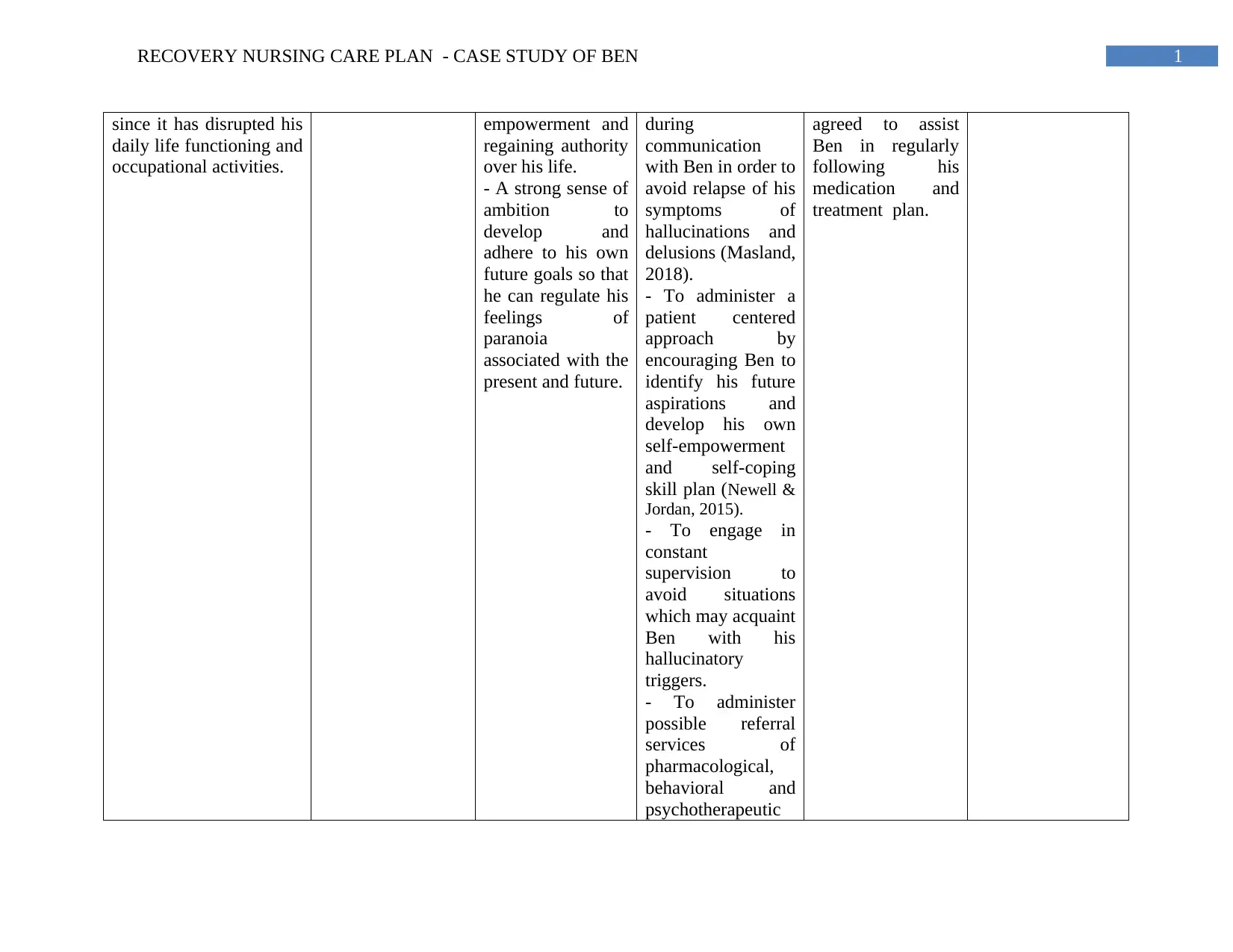
1RECOVERY NURSING CARE PLAN - CASE STUDY OF BEN
since it has disrupted his
daily life functioning and
occupational activities.
empowerment and
regaining authority
over his life.
- A strong sense of
ambition to
develop and
adhere to his own
future goals so that
he can regulate his
feelings of
paranoia
associated with the
present and future.
during
communication
with Ben in order to
avoid relapse of his
symptoms of
hallucinations and
delusions (Masland,
2018).
- To administer a
patient centered
approach by
encouraging Ben to
identify his future
aspirations and
develop his own
self-empowerment
and self-coping
skill plan (Newell &
Jordan, 2015).
- To engage in
constant
supervision to
avoid situations
which may acquaint
Ben with his
hallucinatory
triggers.
- To administer
possible referral
services of
pharmacological,
behavioral and
psychotherapeutic
agreed to assist
Ben in regularly
following his
medication and
treatment plan.
since it has disrupted his
daily life functioning and
occupational activities.
empowerment and
regaining authority
over his life.
- A strong sense of
ambition to
develop and
adhere to his own
future goals so that
he can regulate his
feelings of
paranoia
associated with the
present and future.
during
communication
with Ben in order to
avoid relapse of his
symptoms of
hallucinations and
delusions (Masland,
2018).
- To administer a
patient centered
approach by
encouraging Ben to
identify his future
aspirations and
develop his own
self-empowerment
and self-coping
skill plan (Newell &
Jordan, 2015).
- To engage in
constant
supervision to
avoid situations
which may acquaint
Ben with his
hallucinatory
triggers.
- To administer
possible referral
services of
pharmacological,
behavioral and
psychotherapeutic
agreed to assist
Ben in regularly
following his
medication and
treatment plan.
Secure Best Marks with AI Grader
Need help grading? Try our AI Grader for instant feedback on your assignments.
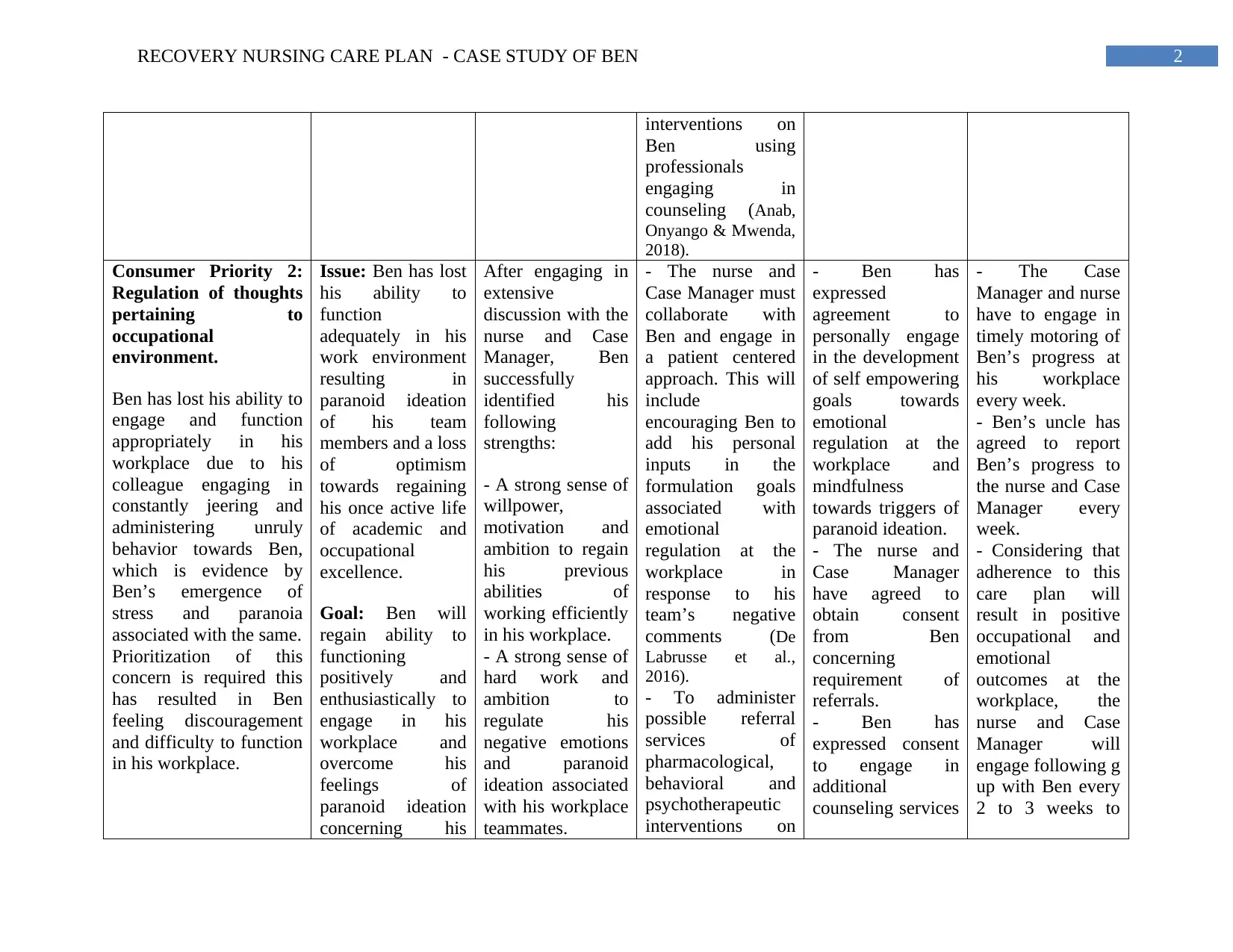
2RECOVERY NURSING CARE PLAN - CASE STUDY OF BEN
interventions on
Ben using
professionals
engaging in
counseling (Anab,
Onyango & Mwenda,
2018).
Consumer Priority 2:
Regulation of thoughts
pertaining to
occupational
environment.
Ben has lost his ability to
engage and function
appropriately in his
workplace due to his
colleague engaging in
constantly jeering and
administering unruly
behavior towards Ben,
which is evidence by
Ben’s emergence of
stress and paranoia
associated with the same.
Prioritization of this
concern is required this
has resulted in Ben
feeling discouragement
and difficulty to function
in his workplace.
Issue: Ben has lost
his ability to
function
adequately in his
work environment
resulting in
paranoid ideation
of his team
members and a loss
of optimism
towards regaining
his once active life
of academic and
occupational
excellence.
Goal: Ben will
regain ability to
functioning
positively and
enthusiastically to
engage in his
workplace and
overcome his
feelings of
paranoid ideation
concerning his
After engaging in
extensive
discussion with the
nurse and Case
Manager, Ben
successfully
identified his
following
strengths:
- A strong sense of
willpower,
motivation and
ambition to regain
his previous
abilities of
working efficiently
in his workplace.
- A strong sense of
hard work and
ambition to
regulate his
negative emotions
and paranoid
ideation associated
with his workplace
teammates.
- The nurse and
Case Manager must
collaborate with
Ben and engage in
a patient centered
approach. This will
include
encouraging Ben to
add his personal
inputs in the
formulation goals
associated with
emotional
regulation at the
workplace in
response to his
team’s negative
comments (De
Labrusse et al.,
2016).
- To administer
possible referral
services of
pharmacological,
behavioral and
psychotherapeutic
interventions on
- Ben has
expressed
agreement to
personally engage
in the development
of self empowering
goals towards
emotional
regulation at the
workplace and
mindfulness
towards triggers of
paranoid ideation.
- The nurse and
Case Manager
have agreed to
obtain consent
from Ben
concerning
requirement of
referrals.
- Ben has
expressed consent
to engage in
additional
counseling services
- The Case
Manager and nurse
have to engage in
timely motoring of
Ben’s progress at
his workplace
every week.
- Ben’s uncle has
agreed to report
Ben’s progress to
the nurse and Case
Manager every
week.
- Considering that
adherence to this
care plan will
result in positive
occupational and
emotional
outcomes at the
workplace, the
nurse and Case
Manager will
engage following g
up with Ben every
2 to 3 weeks to
interventions on
Ben using
professionals
engaging in
counseling (Anab,
Onyango & Mwenda,
2018).
Consumer Priority 2:
Regulation of thoughts
pertaining to
occupational
environment.
Ben has lost his ability to
engage and function
appropriately in his
workplace due to his
colleague engaging in
constantly jeering and
administering unruly
behavior towards Ben,
which is evidence by
Ben’s emergence of
stress and paranoia
associated with the same.
Prioritization of this
concern is required this
has resulted in Ben
feeling discouragement
and difficulty to function
in his workplace.
Issue: Ben has lost
his ability to
function
adequately in his
work environment
resulting in
paranoid ideation
of his team
members and a loss
of optimism
towards regaining
his once active life
of academic and
occupational
excellence.
Goal: Ben will
regain ability to
functioning
positively and
enthusiastically to
engage in his
workplace and
overcome his
feelings of
paranoid ideation
concerning his
After engaging in
extensive
discussion with the
nurse and Case
Manager, Ben
successfully
identified his
following
strengths:
- A strong sense of
willpower,
motivation and
ambition to regain
his previous
abilities of
working efficiently
in his workplace.
- A strong sense of
hard work and
ambition to
regulate his
negative emotions
and paranoid
ideation associated
with his workplace
teammates.
- The nurse and
Case Manager must
collaborate with
Ben and engage in
a patient centered
approach. This will
include
encouraging Ben to
add his personal
inputs in the
formulation goals
associated with
emotional
regulation at the
workplace in
response to his
team’s negative
comments (De
Labrusse et al.,
2016).
- To administer
possible referral
services of
pharmacological,
behavioral and
psychotherapeutic
interventions on
- Ben has
expressed
agreement to
personally engage
in the development
of self empowering
goals towards
emotional
regulation at the
workplace and
mindfulness
towards triggers of
paranoid ideation.
- The nurse and
Case Manager
have agreed to
obtain consent
from Ben
concerning
requirement of
referrals.
- Ben has
expressed consent
to engage in
additional
counseling services
- The Case
Manager and nurse
have to engage in
timely motoring of
Ben’s progress at
his workplace
every week.
- Ben’s uncle has
agreed to report
Ben’s progress to
the nurse and Case
Manager every
week.
- Considering that
adherence to this
care plan will
result in positive
occupational and
emotional
outcomes at the
workplace, the
nurse and Case
Manager will
engage following g
up with Ben every
2 to 3 weeks to

3RECOVERY NURSING CARE PLAN - CASE STUDY OF BEN
teammates
behaviors.
HONOS Score: 3
- A strong sense of
awareness on the
need to overcome
his occupational
difficulties in order
to regain his
functional
capabilities.
- A strong sense of
humor which Ben
has realized can be
used for the
purpose of
regulation of his
thoughts in
response to his
colleague’s
comments.
- A potential for
creativity which
Ben has realized,
can pave the way
for future
additional
opportunities of
alternative jobs
appropriate to his
skill set and
abilities.
Ben management of
workplace stress
using professionals
engaging in
counseling (Vera-
Garcia et al., 2015).
- To encourage Ben
to engage in
mindfulness and
self-reflection to
identify his
emotional triggers
at work and obtain
personal insights on
his strengths,
weaknesses and
possible
improvements in
the future (Murnane
et al., 2016).
- To administer a
family centered
approach and
communicate with
Ben’s uncle on
monitoring mental
health related
occupational
hazards in his
workplace or
discuss the
possibilities of
disseminating
for his emotional
regulation and
paranoia at the
workplace.
- After using a
family centered
approach, Ben’s
uncle has
enthusiastically
agreed to assist
Ben in receiving an
appropriate work
environment,
explore novel
employment
opportunities and
educate workers on
workplace
bullying.
measure care plan
effectiveness.
teammates
behaviors.
HONOS Score: 3
- A strong sense of
awareness on the
need to overcome
his occupational
difficulties in order
to regain his
functional
capabilities.
- A strong sense of
humor which Ben
has realized can be
used for the
purpose of
regulation of his
thoughts in
response to his
colleague’s
comments.
- A potential for
creativity which
Ben has realized,
can pave the way
for future
additional
opportunities of
alternative jobs
appropriate to his
skill set and
abilities.
Ben management of
workplace stress
using professionals
engaging in
counseling (Vera-
Garcia et al., 2015).
- To encourage Ben
to engage in
mindfulness and
self-reflection to
identify his
emotional triggers
at work and obtain
personal insights on
his strengths,
weaknesses and
possible
improvements in
the future (Murnane
et al., 2016).
- To administer a
family centered
approach and
communicate with
Ben’s uncle on
monitoring mental
health related
occupational
hazards in his
workplace or
discuss the
possibilities of
disseminating
for his emotional
regulation and
paranoia at the
workplace.
- After using a
family centered
approach, Ben’s
uncle has
enthusiastically
agreed to assist
Ben in receiving an
appropriate work
environment,
explore novel
employment
opportunities and
educate workers on
workplace
bullying.
measure care plan
effectiveness.
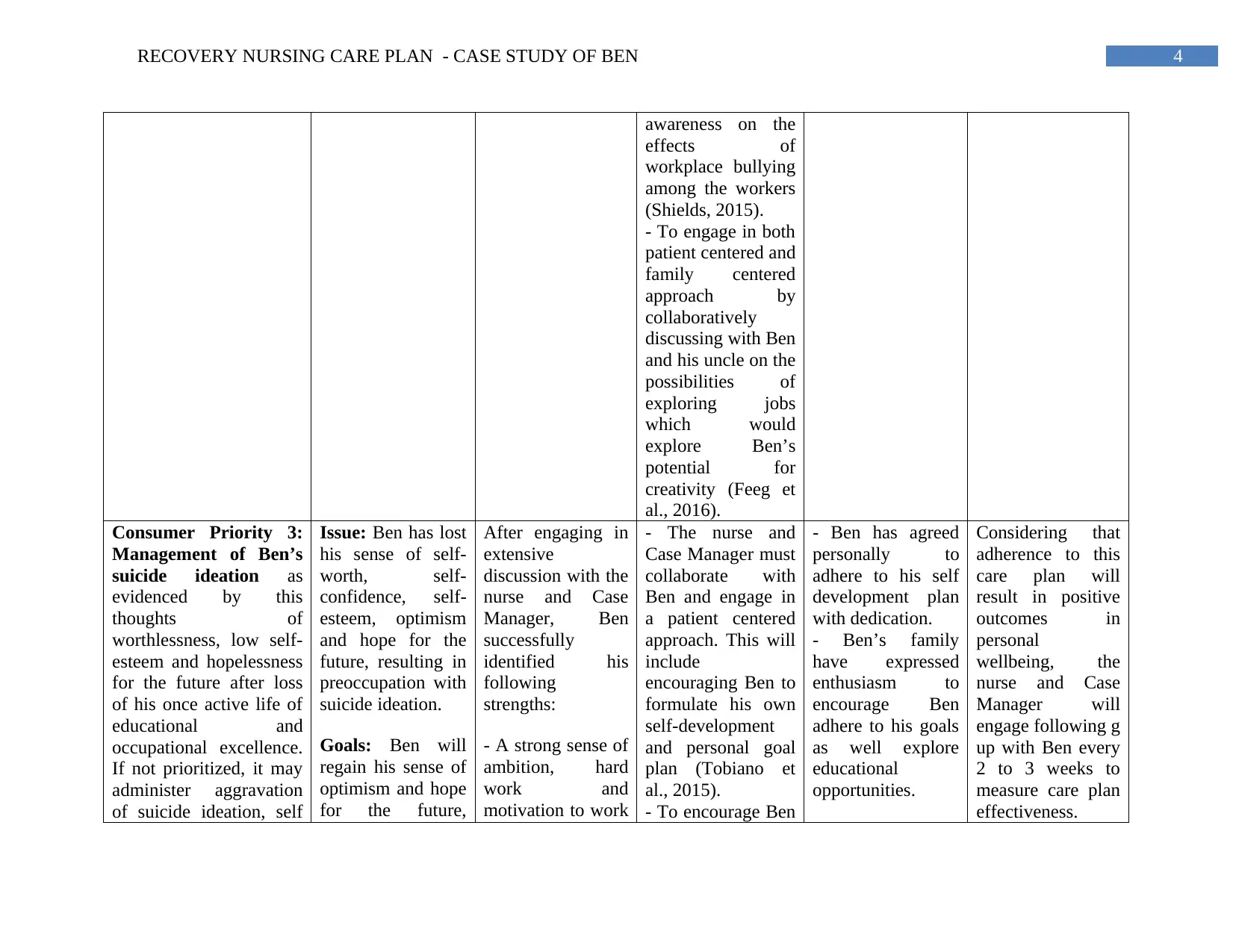
4RECOVERY NURSING CARE PLAN - CASE STUDY OF BEN
awareness on the
effects of
workplace bullying
among the workers
(Shields, 2015).
- To engage in both
patient centered and
family centered
approach by
collaboratively
discussing with Ben
and his uncle on the
possibilities of
exploring jobs
which would
explore Ben’s
potential for
creativity (Feeg et
al., 2016).
Consumer Priority 3:
Management of Ben’s
suicide ideation as
evidenced by this
thoughts of
worthlessness, low self-
esteem and hopelessness
for the future after loss
of his once active life of
educational and
occupational excellence.
If not prioritized, it may
administer aggravation
of suicide ideation, self
Issue: Ben has lost
his sense of self-
worth, self-
confidence, self-
esteem, optimism
and hope for the
future, resulting in
preoccupation with
suicide ideation.
Goals: Ben will
regain his sense of
optimism and hope
for the future,
After engaging in
extensive
discussion with the
nurse and Case
Manager, Ben
successfully
identified his
following
strengths:
- A strong sense of
ambition, hard
work and
motivation to work
- The nurse and
Case Manager must
collaborate with
Ben and engage in
a patient centered
approach. This will
include
encouraging Ben to
formulate his own
self-development
and personal goal
plan (Tobiano et
al., 2015).
- To encourage Ben
- Ben has agreed
personally to
adhere to his self
development plan
with dedication.
- Ben’s family
have expressed
enthusiasm to
encourage Ben
adhere to his goals
as well explore
educational
opportunities.
Considering that
adherence to this
care plan will
result in positive
outcomes in
personal
wellbeing, the
nurse and Case
Manager will
engage following g
up with Ben every
2 to 3 weeks to
measure care plan
effectiveness.
awareness on the
effects of
workplace bullying
among the workers
(Shields, 2015).
- To engage in both
patient centered and
family centered
approach by
collaboratively
discussing with Ben
and his uncle on the
possibilities of
exploring jobs
which would
explore Ben’s
potential for
creativity (Feeg et
al., 2016).
Consumer Priority 3:
Management of Ben’s
suicide ideation as
evidenced by this
thoughts of
worthlessness, low self-
esteem and hopelessness
for the future after loss
of his once active life of
educational and
occupational excellence.
If not prioritized, it may
administer aggravation
of suicide ideation, self
Issue: Ben has lost
his sense of self-
worth, self-
confidence, self-
esteem, optimism
and hope for the
future, resulting in
preoccupation with
suicide ideation.
Goals: Ben will
regain his sense of
optimism and hope
for the future,
After engaging in
extensive
discussion with the
nurse and Case
Manager, Ben
successfully
identified his
following
strengths:
- A strong sense of
ambition, hard
work and
motivation to work
- The nurse and
Case Manager must
collaborate with
Ben and engage in
a patient centered
approach. This will
include
encouraging Ben to
formulate his own
self-development
and personal goal
plan (Tobiano et
al., 2015).
- To encourage Ben
- Ben has agreed
personally to
adhere to his self
development plan
with dedication.
- Ben’s family
have expressed
enthusiasm to
encourage Ben
adhere to his goals
as well explore
educational
opportunities.
Considering that
adherence to this
care plan will
result in positive
outcomes in
personal
wellbeing, the
nurse and Case
Manager will
engage following g
up with Ben every
2 to 3 weeks to
measure care plan
effectiveness.
Paraphrase This Document
Need a fresh take? Get an instant paraphrase of this document with our AI Paraphraser
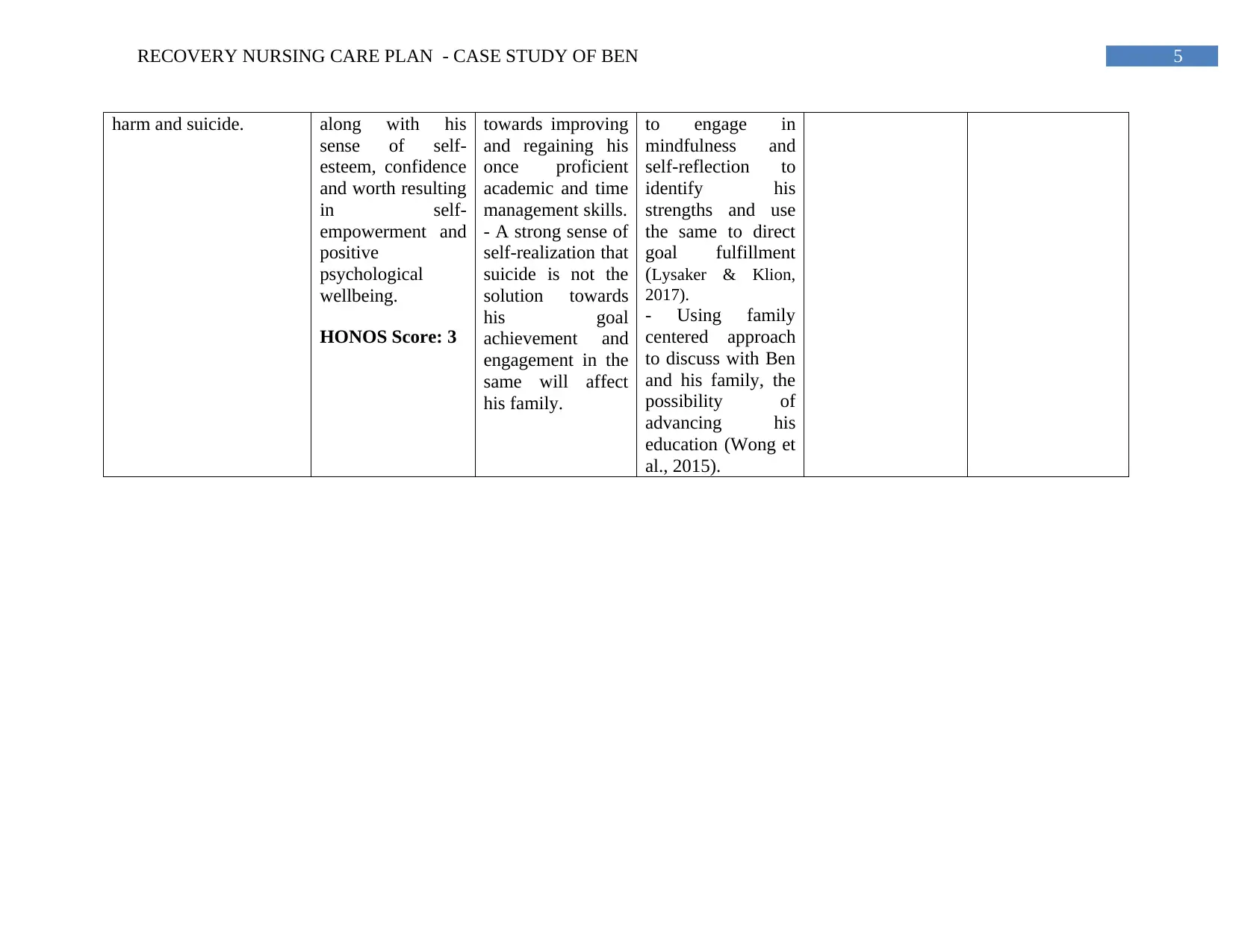
5RECOVERY NURSING CARE PLAN - CASE STUDY OF BEN
harm and suicide. along with his
sense of self-
esteem, confidence
and worth resulting
in self-
empowerment and
positive
psychological
wellbeing.
HONOS Score: 3
towards improving
and regaining his
once proficient
academic and time
management skills.
- A strong sense of
self-realization that
suicide is not the
solution towards
his goal
achievement and
engagement in the
same will affect
his family.
to engage in
mindfulness and
self-reflection to
identify his
strengths and use
the same to direct
goal fulfillment
(Lysaker & Klion,
2017).
- Using family
centered approach
to discuss with Ben
and his family, the
possibility of
advancing his
education (Wong et
al., 2015).
harm and suicide. along with his
sense of self-
esteem, confidence
and worth resulting
in self-
empowerment and
positive
psychological
wellbeing.
HONOS Score: 3
towards improving
and regaining his
once proficient
academic and time
management skills.
- A strong sense of
self-realization that
suicide is not the
solution towards
his goal
achievement and
engagement in the
same will affect
his family.
to engage in
mindfulness and
self-reflection to
identify his
strengths and use
the same to direct
goal fulfillment
(Lysaker & Klion,
2017).
- Using family
centered approach
to discuss with Ben
and his family, the
possibility of
advancing his
education (Wong et
al., 2015).
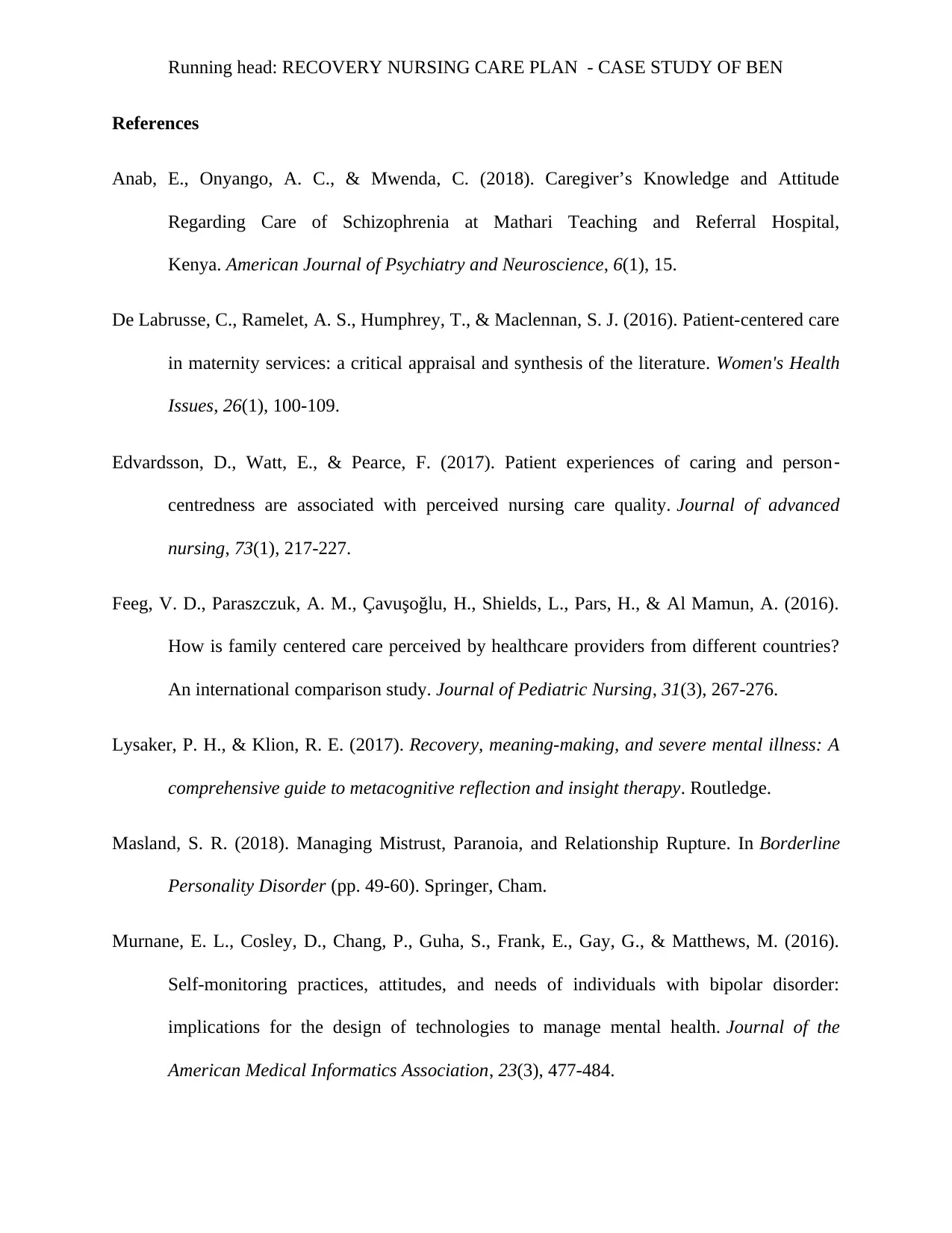
Running head: RECOVERY NURSING CARE PLAN - CASE STUDY OF BEN
References
Anab, E., Onyango, A. C., & Mwenda, C. (2018). Caregiver’s Knowledge and Attitude
Regarding Care of Schizophrenia at Mathari Teaching and Referral Hospital,
Kenya. American Journal of Psychiatry and Neuroscience, 6(1), 15.
De Labrusse, C., Ramelet, A. S., Humphrey, T., & Maclennan, S. J. (2016). Patient-centered care
in maternity services: a critical appraisal and synthesis of the literature. Women's Health
Issues, 26(1), 100-109.
Edvardsson, D., Watt, E., & Pearce, F. (2017). Patient experiences of caring and person‐
centredness are associated with perceived nursing care quality. Journal of advanced
nursing, 73(1), 217-227.
Feeg, V. D., Paraszczuk, A. M., Çavuşoğlu, H., Shields, L., Pars, H., & Al Mamun, A. (2016).
How is family centered care perceived by healthcare providers from different countries?
An international comparison study. Journal of Pediatric Nursing, 31(3), 267-276.
Lysaker, P. H., & Klion, R. E. (2017). Recovery, meaning-making, and severe mental illness: A
comprehensive guide to metacognitive reflection and insight therapy. Routledge.
Masland, S. R. (2018). Managing Mistrust, Paranoia, and Relationship Rupture. In Borderline
Personality Disorder (pp. 49-60). Springer, Cham.
Murnane, E. L., Cosley, D., Chang, P., Guha, S., Frank, E., Gay, G., & Matthews, M. (2016).
Self-monitoring practices, attitudes, and needs of individuals with bipolar disorder:
implications for the design of technologies to manage mental health. Journal of the
American Medical Informatics Association, 23(3), 477-484.
References
Anab, E., Onyango, A. C., & Mwenda, C. (2018). Caregiver’s Knowledge and Attitude
Regarding Care of Schizophrenia at Mathari Teaching and Referral Hospital,
Kenya. American Journal of Psychiatry and Neuroscience, 6(1), 15.
De Labrusse, C., Ramelet, A. S., Humphrey, T., & Maclennan, S. J. (2016). Patient-centered care
in maternity services: a critical appraisal and synthesis of the literature. Women's Health
Issues, 26(1), 100-109.
Edvardsson, D., Watt, E., & Pearce, F. (2017). Patient experiences of caring and person‐
centredness are associated with perceived nursing care quality. Journal of advanced
nursing, 73(1), 217-227.
Feeg, V. D., Paraszczuk, A. M., Çavuşoğlu, H., Shields, L., Pars, H., & Al Mamun, A. (2016).
How is family centered care perceived by healthcare providers from different countries?
An international comparison study. Journal of Pediatric Nursing, 31(3), 267-276.
Lysaker, P. H., & Klion, R. E. (2017). Recovery, meaning-making, and severe mental illness: A
comprehensive guide to metacognitive reflection and insight therapy. Routledge.
Masland, S. R. (2018). Managing Mistrust, Paranoia, and Relationship Rupture. In Borderline
Personality Disorder (pp. 49-60). Springer, Cham.
Murnane, E. L., Cosley, D., Chang, P., Guha, S., Frank, E., Gay, G., & Matthews, M. (2016).
Self-monitoring practices, attitudes, and needs of individuals with bipolar disorder:
implications for the design of technologies to manage mental health. Journal of the
American Medical Informatics Association, 23(3), 477-484.
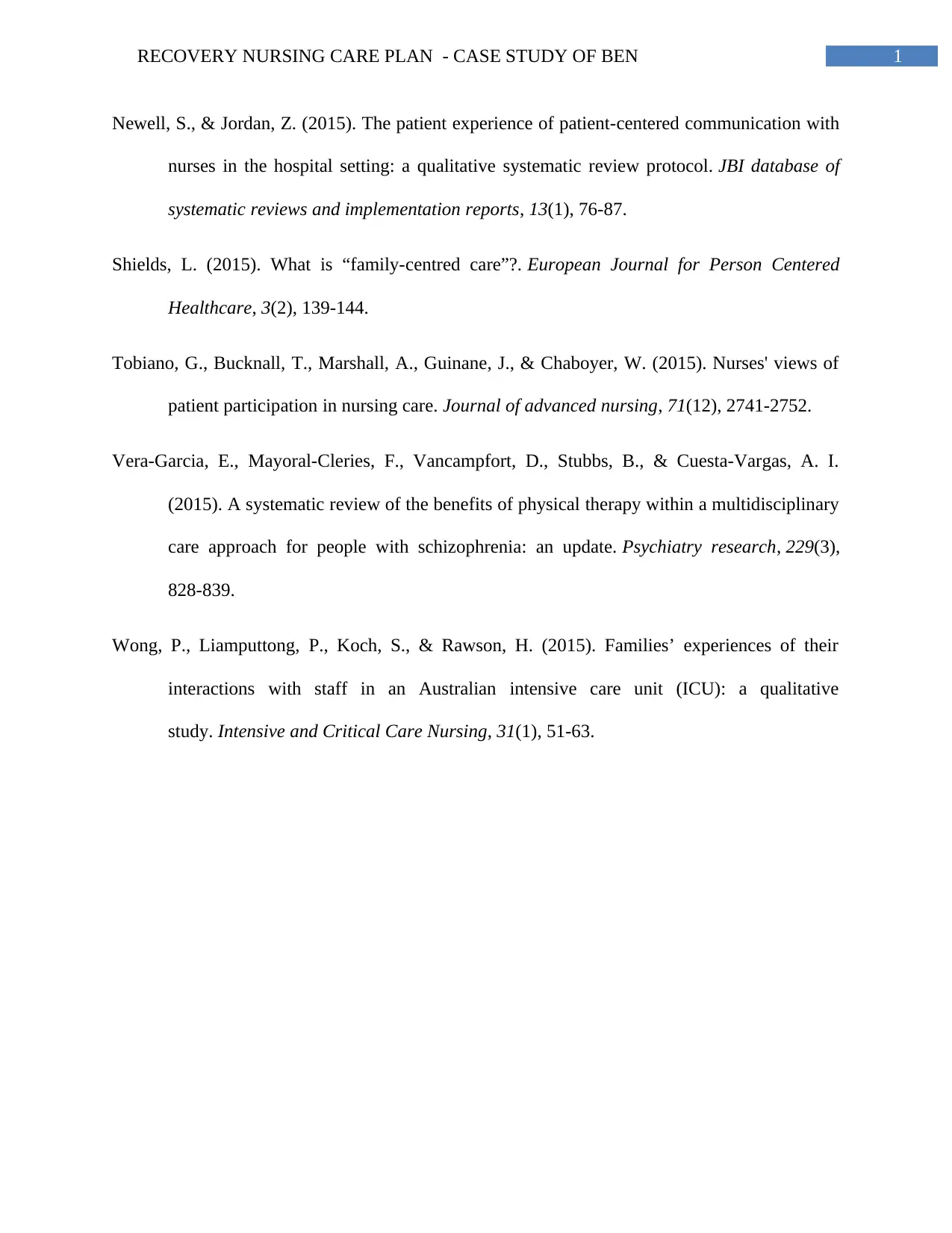
1RECOVERY NURSING CARE PLAN - CASE STUDY OF BEN
Newell, S., & Jordan, Z. (2015). The patient experience of patient-centered communication with
nurses in the hospital setting: a qualitative systematic review protocol. JBI database of
systematic reviews and implementation reports, 13(1), 76-87.
Shields, L. (2015). What is “family-centred care”?. European Journal for Person Centered
Healthcare, 3(2), 139-144.
Tobiano, G., Bucknall, T., Marshall, A., Guinane, J., & Chaboyer, W. (2015). Nurses' views of
patient participation in nursing care. Journal of advanced nursing, 71(12), 2741-2752.
Vera-Garcia, E., Mayoral-Cleries, F., Vancampfort, D., Stubbs, B., & Cuesta-Vargas, A. I.
(2015). A systematic review of the benefits of physical therapy within a multidisciplinary
care approach for people with schizophrenia: an update. Psychiatry research, 229(3),
828-839.
Wong, P., Liamputtong, P., Koch, S., & Rawson, H. (2015). Families’ experiences of their
interactions with staff in an Australian intensive care unit (ICU): a qualitative
study. Intensive and Critical Care Nursing, 31(1), 51-63.
Newell, S., & Jordan, Z. (2015). The patient experience of patient-centered communication with
nurses in the hospital setting: a qualitative systematic review protocol. JBI database of
systematic reviews and implementation reports, 13(1), 76-87.
Shields, L. (2015). What is “family-centred care”?. European Journal for Person Centered
Healthcare, 3(2), 139-144.
Tobiano, G., Bucknall, T., Marshall, A., Guinane, J., & Chaboyer, W. (2015). Nurses' views of
patient participation in nursing care. Journal of advanced nursing, 71(12), 2741-2752.
Vera-Garcia, E., Mayoral-Cleries, F., Vancampfort, D., Stubbs, B., & Cuesta-Vargas, A. I.
(2015). A systematic review of the benefits of physical therapy within a multidisciplinary
care approach for people with schizophrenia: an update. Psychiatry research, 229(3),
828-839.
Wong, P., Liamputtong, P., Koch, S., & Rawson, H. (2015). Families’ experiences of their
interactions with staff in an Australian intensive care unit (ICU): a qualitative
study. Intensive and Critical Care Nursing, 31(1), 51-63.
1 out of 10
Related Documents
Your All-in-One AI-Powered Toolkit for Academic Success.
+13062052269
info@desklib.com
Available 24*7 on WhatsApp / Email
![[object Object]](/_next/static/media/star-bottom.7253800d.svg)
Unlock your academic potential
© 2024 | Zucol Services PVT LTD | All rights reserved.





